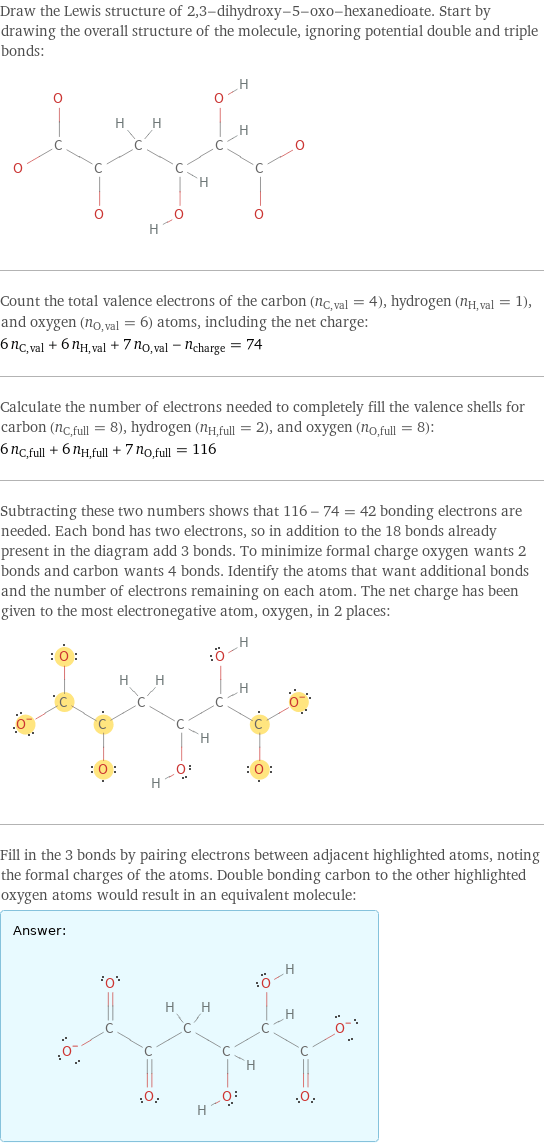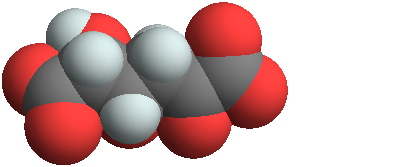Input interpretation

2, 3-dihydroxy-5-oxo-hexanedioate
Chemical names and formulas

formula | C_6H_6O_7 name | 2, 3-dihydroxy-5-oxo-hexanedioate IUPAC name | (2R, 3S)-2, 3-dihydroxy-5-oxohexanedioate mass fractions | C (carbon) 37.9% | H (hydrogen) 3.18% | O (oxygen) 58.9%
Lewis structure

Draw the Lewis structure of 2, 3-dihydroxy-5-oxo-hexanedioate. Start by drawing the overall structure of the molecule, ignoring potential double and triple bonds: Count the total valence electrons of the carbon (n_C, val = 4), hydrogen (n_H, val = 1), and oxygen (n_O, val = 6) atoms, including the net charge: 6 n_C, val + 6 n_H, val + 7 n_O, val - n_charge = 74 Calculate the number of electrons needed to completely fill the valence shells for carbon (n_C, full = 8), hydrogen (n_H, full = 2), and oxygen (n_O, full = 8): 6 n_C, full + 6 n_H, full + 7 n_O, full = 116 Subtracting these two numbers shows that 116 - 74 = 42 bonding electrons are needed. Each bond has two electrons, so in addition to the 18 bonds already present in the diagram add 3 bonds. To minimize formal charge oxygen wants 2 bonds and carbon wants 4 bonds. Identify the atoms that want additional bonds and the number of electrons remaining on each atom. The net charge has been given to the most electronegative atom, oxygen, in 2 places: Fill in the 3 bonds by pairing electrons between adjacent highlighted atoms, noting the formal charges of the atoms. Double bonding carbon to the other highlighted oxygen atoms would result in an equivalent molecule: Answer: | |
3D structure

3D structure
Basic properties

molar mass | 190.11 g/mol phase | solid (at STP)
Units

Hydrophobicity and permeability properties

predicted LogP hydrophobicity | -1.35 predicted LogS | 0.06
Basic drug properties

approval status | experimental | small molecule
Chemical identifiers
![PubChem CID number | 5288442 PubChem SID number | 7887917 SMILES identifier | C(C(C(C(=O)[O-])O)O)C(=O)C(=O)[O-] InChI identifier | InChI=1/C6H8O7/c7-2(4(9)6(12)13)1-3(8)5(10)11/h2, 4, 7, 9H, 1H2, (H, 10, 11)(H, 12, 13)/p-2/fC6H6O7/q-2 InChI key | QUURPCHWPQNNGL-JRXJJLCYCU](../image_source/60070e48269794f26ce238c245ab5dec.png)
PubChem CID number | 5288442 PubChem SID number | 7887917 SMILES identifier | C(C(C(C(=O)[O-])O)O)C(=O)C(=O)[O-] InChI identifier | InChI=1/C6H8O7/c7-2(4(9)6(12)13)1-3(8)5(10)11/h2, 4, 7, 9H, 1H2, (H, 10, 11)(H, 12, 13)/p-2/fC6H6O7/q-2 InChI key | QUURPCHWPQNNGL-JRXJJLCYCU